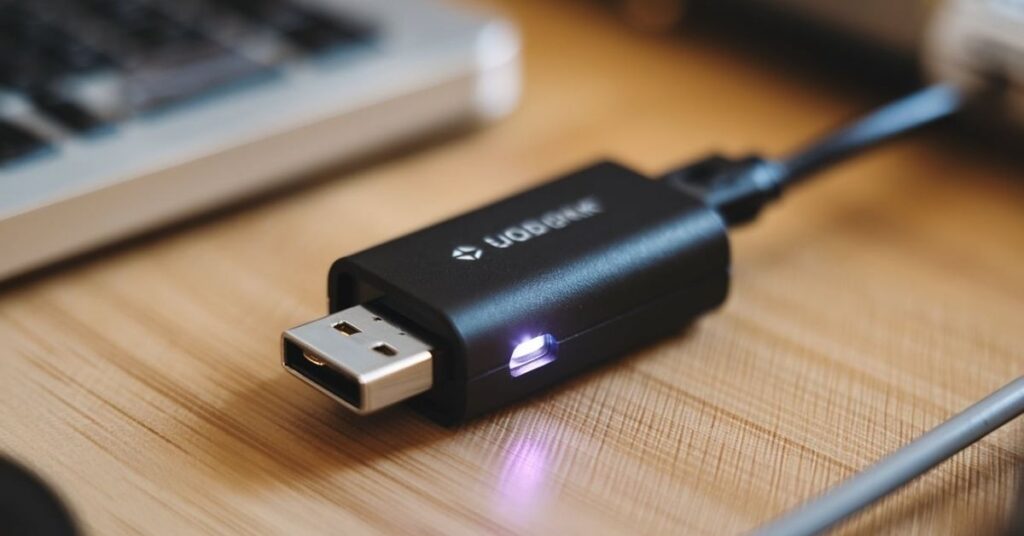Public USB charging stations in places like airports, cafes, and malls offer convenience, but they also pose hidden risks. Cybercriminals exploit these stations to steal sensitive data or inject malware into devices—a tactic known as “Juice Jacking.” This alarming threat underscores the importance of safeguarding personal information when using public USB ports.
A USB data blocker is an innovative yet simple solution to this problem. It prevents unauthorized data transfer while allowing your device to charge safely, ensuring protection against potential cyber threats.
In today’s interconnected world, where private data like passwords, banking details, and personal files are constantly at risk, a USB data blocker offers peace of mind. It’s an essential tool for anyone who values their privacy and wants to charge devices securely in public spaces.
What Is a USB Data Blocker?
A USB data blocker is a small, practical device designed to protect your personal data from being accessed or stolen while charging your device at public USB charging stations. These charging stations, commonly found in airports, malls, coffee shops, and hotels, may seem convenient, but they come with significant security risks. Cybercriminals can exploit these ports to steal information, inject malware, or perform malicious activities through a process known as Juice Jacking.
The USB data blocker works by blocking the data transmission lines (the data pins) of the USB connection while still allowing the power lines (the power pins) to pass through. This means that your device can still receive power and charge, but no data can be transferred between your device and the charging port. This simple yet effective mechanism ensures that your data is safe, even when you’re charging your device in a public or potentially unsecured environment.
In today’s highly connected world, where digital security threats are ever-growing, USB data blockers have become an essential tool for safeguarding sensitive information. They provide peace of mind by protecting personal data, such as passwords, banking information, and confidential files, from unauthorized access. With the increasing reliance on public spaces for charging our smartphones, tablets, and other devices, using a USB data blocker is a smart and necessary measure to ensure your security while on the go.
How Does a USB Data Blocker Work?
A USB data blocker works by cleverly blocking the data transmission lines (also called data pins) in a USB cable, while still allowing the power lines (power pins) to work. Let’s break this down:
- Data Pins Blocked: When you plug your device into a USB port with a data blocker, the device prevents the data pins from making a connection. This means no data can be transferred between your device and the charging station. This stops hackers from accessing your personal information or infecting your device with malware.
- Power Pins Active: Despite blocking the data lines, the power lines remain active. This allows your device to receive power and charge as usual, without the risk of data transfer.
This simple mechanism keeps your device safe from cyber threats while still giving you the ability to charge in public places.
Compatibility with Devices
USB data blockers are designed to be compatible with a wide range of devices. Whether you’re charging a smartphone, tablet, laptop, or other USB-powered devices, a data blocker will work. Most of these devices use standard USB charging ports (like USB-A or USB-C), and the data blocker fits seamlessly between the charging cable and the USB port.
Since USB data blockers are small and portable, they work with any device that charges via USB. Whether you’re using Android, iPhone, or any other USB-compatible device, you can use a USB data blocker to ensure your charging is secure.
Benefits of Using a USB Data Blocker
A USB data blocker offers several important benefits that help protect your device and personal data when charging in public places. Here are the key advantages:
- Protects Against Data Theft and Malware: One of the biggest risks when using public charging stations is Juice Jacking, where hackers steal your data or infect your device with malware. A USB data blocker blocks data transfer, so your device stays safe from these threats.
- Affordable and Portable Solution for Secure Charging: USB data blockers are inexpensive and easy to carry. They are small enough to fit in your pocket or bag, making them a convenient and cost-effective way to ensure safe charging anytime, anywhere.
- Enhances Cybersecurity for Travelers and Professionals: If you’re traveling or working in public spaces, using a USB data blocker adds an extra layer of protection for your personal and professional information. It’s especially useful for those who need to charge their devices in airports, hotels, or public offices, where security risks are higher.
When and Where Should You Use a USB Data Blocker?
A USB data blocker should be used in any situation where you’re charging your device in a public or shared space. These are the places where your device and data are most vulnerable to cyber threats. Here are some key locations and scenarios where using a USB data blocker is highly recommended:
- Public Charging Stations (Airports, Malls, Cafes): Public charging stations are found in many places like airports, shopping malls, coffee shops, and public transportation hubs. While convenient, these stations are often unprotected, which makes them an easy target for hackers. Cybercriminals can use these ports to steal data or even install malware on your device without your knowledge. Using a USB data blocker at these charging stations ensures that only power is transferred, keeping your data safe and secure.
- Hotel Rooms and Shared USB Hubs: Hotels and other shared spaces often provide USB charging ports in rooms or common areas, and these are great for charging on the go. However, the risk of unauthorized access to your device is higher in these environments. Anyone could have access to these ports, making it easier for cybercriminals to attempt Juice Jacking or malware injection. A USB data blocker helps protect your device when you need to charge in places like hotel rooms, airport lounges, or shared workspaces, giving you peace of mind.
- During Travel or While Attending Conferences: Travel often means charging on the move—whether in airports, train stations, bus terminals, or even while attending conferences. These locations are convenient, but the security of the USB ports is often questionable. In crowded and busy places, hackers may target your devices. By using a USB data blocker during travel or at conferences, you ensure that no one can access or steal your sensitive data while you’re charging your device. This is especially important for professionals who travel frequently or need to keep sensitive work-related information safe.
Using a USB data blocker in these situations is an easy and affordable way to add an extra layer of security to your devices, allowing you to charge safely and without worrying about potential threats.
How to Choose the Right USB Data Blocker
When selecting a USB data blocker, it’s important to make sure you’re getting a quality product that will protect your data effectively. Here are some key features to look for when choosing the right one:
- Build Quality: The USB data blocker should be made of durable materials that can withstand daily use. Look for products that are compact, well-built, and can handle frequent plugging and unplugging without breaking easily. A solid build ensures long-lasting protection for your devices.
- Compatibility: Make sure the data blocker is compatible with your device. Most data blockers work with standard USB ports (USB-A, USB-C), but you should double-check that it fits with your phone, tablet, laptop, or any other device you plan to charge. Some models may also be designed to work with both Android and iOS devices.
- Certifications: It’s a good idea to choose a USB data blocker that comes with some form of certification. Certifications can indicate that the product has been tested and meets safety standards. Look for products with certifications from recognized organizations or manufacturers with a solid reputation for quality.
Recommended Brands or Products
While there are many brands offering USB data blockers, some well-known and trusted options include:
- Juice-Jack Defender – A popular and reliable brand known for its high-quality, compact design.
- PortSafe – Known for offering durable and easy-to-use data blockers.
- TravelReady – Offers a range of affordable and travel-friendly USB data blockers with good build quality.
These brands are trusted by consumers and provide solid products for protecting your data while charging.
Tips for Avoiding Counterfeit Products
Unfortunately, counterfeit products are common in the tech industry, and USB data blockers are no exception. Here are some tips to avoid buying fake or low-quality products:
- Buy from trusted retailers: Always purchase USB data blockers from well-known stores or official websites. Avoid buying from unknown, unverified sellers on platforms like eBay or questionable online shops.
- Check for reviews: Before buying, read reviews from other customers. Look for products with positive feedback and ratings. Be cautious if a product has little to no reviews or has many negative ones.
- Inspect the product: When you receive your USB data blocker, inspect it for signs of poor craftsmanship. Look for any misspellings on the packaging, cheap materials, or loose parts, as these may indicate a counterfeit item.
By keeping these points in mind, you can select a high-quality USB data blocker that will keep your devices safe from cyber threats while charging.
Alternative Ways to Secure Your USB Data
While using a USB data blocker is one of the best ways to protect your data when charging, there are also other methods you can use to keep your device secure in public spaces. Here are a few options:
1. Use Portable Power Banks
Instead of relying on public charging stations, you can carry a portable power bank with you. These compact devices allow you to charge your phone or other gadgets on the go without needing to plug into potentially risky USB ports. With a power bank, you can charge your device securely, avoiding the risk of data theft or malware.
2. Avoid Public Charging Stations Altogether
Whenever possible, avoid using public USB charging stations entirely. While they may be convenient, they can pose a significant security risk. If you don’t have access to a power bank, consider using a regular wall outlet with your own adapter to charge your device instead. This way, you don’t expose your device to the potential dangers of public USB ports.
3. Turn Off Data Transfer While Charging
Some devices allow you to disable data transfer while charging through manual settings. This can be done by simply turning off the “Data Sync” or “Media Transfer Protocol (MTP)” option in your phone’s settings. By doing this, you can ensure that your device only draws power from the USB connection, without any data being transferred. This provides an added layer of protection against unauthorized access.
These methods can be used alongside a USB data blocker for added security, helping you keep your device and personal information safe when charging in public spaces.
Conclusion
In today’s digital world, USB data blockers play a vital role in protecting your sensitive information from cyber threats, especially when charging your devices in public spaces. By blocking data transfer while allowing your device to charge, they help prevent unauthorized access, malware, and data theft.
Investing in a USB data blocker is a smart and affordable choice to ensure your personal and professional data remains safe. Don’t take unnecessary risks with your device—use a USB data blocker for peace of mind whenever you charge in public areas.


